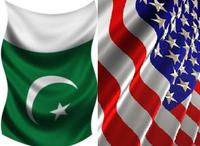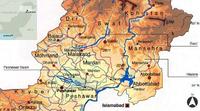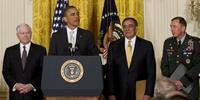-
Pakistan: duplicitous and impotent
While most of the attention in the past week was paid to who in the Pakistani government was protecting bin Laden, there is another question that the raid by the SEALs exposed: the impotence of the Pakistani military; since 9/11, the United States has given Pakistan more than $10 billion in military aid; the United States wanted these funds to go to counter-terrorism efforts; the Pakistanis used this money toward conventional equipment geared toward a war with India; the raid exposed the fact that the Pakistanis have not done a very good job at that
-
-
Civil rights groups seek to block Utah's immigration law
On Tuesday, two civil rights and immigration advocacy groups filed lawsuits against Utah in an attempt to stop a tough Arizona-style law from taking effect; Utah’s immigration law is scheduled to take hold on 10 May and comes after legislators made many compromises to draft a bill that they thought would avoid legal challenges; the American Civil Liberties and Union (ACLU) and the National Immigration Law Center brought forth a class-action lawsuit against the law on the grounds that it interferes with the federal government’s responsibility to enforce immigration; Utah’s attorney general is determined to defend the law
-
-
Enough already: UNHRC leader questions killing of OBL
The ultimate oxymoron of our time? Easy: “UN High Commissioner for Human Rights”; the UN does not promote human rights or advance human rights because it cannot do so; it cannot do so because the human rights record of most of its members is nothing short of appalling; what do we want these UN members to do: volunteer to vote for and promote the very values they reject and suppress at home? Now the leader of the UN human rights body raises questions about the U.S. killing of OBL; the George W. Bush administration withdrew the United States from the UNHRC; two years ago the Obama administration re-joined that body in the hope of reforming it; it is time — high time — for the administration to admit it made a mistake and withdraw U.S. membership
-
-
Philadelphia police hold emergency exercise
On Wednesday morning the Philadelphia police department held a training exercise to help prepare officers to respond during a terrorist attack; starting at 10:30 AM roughly 50 officers gathered on 22nd Street and JFK Boulevard where they were given assignments, briefed, and eventually deployed to cover different sections of Center City; The drill involved members of the department’s Homeland Security Unit and was a rapid deployment exercise that reflected Philadelphia’s heightened level of awareness following the death of Osama bin Laden
-
-
U.S. lawmakers want reconsideration of massive aid to Pakistan

U.S. lawmakers and policy makers are expressing growing exasperation with Pakistan over its attitude toward Islamic terrorism; Rep. Ted Poe (R-Texas) plans to introduce legislation this week to freeze U.S. aid to Pakistan “unless the State Department can certify to Congress that Pakistan was not harboring America’s number one enemy”; Senator Frank Lautenberg (D-New Jersey) similarly called for more information on what Pakistan knew before they can receive the $3 billion in foreign aid requested for Pakistan in 2012, and potentially more in additional military funding; John Brennan, President Obama’s counterterrorism advisor, said it is “inconceivable” to think bin Laden did not have a support system
-
-
Portland rejoins federal terrorism task force

Following a failed terrorist attack on Thanksgiving of last year, Portland, Oregon has opted to rejoin a federal task force aimed at combatting terrorism; in 2005 Portland became the first city in the United States to stop participating in the Joint Terrorism Task Force; but Portland has chosen to rejoin the task force after it was largely left in the dark during an FBI sting operation; the resolution instructs local police officers to err on the side of Oregon laws if they are more “restrictive” than federal laws when it comes to investigations; Portland officers will also be able to participate in regular counterterror briefings with federal and state law enforcement agencies
-
-
Heightened alert over reprisal attacks
With the death of Osama bin Laden, there is a growing expectation of revenge attacks against the United States and its interests, and growing questions about its new leadership; al-Qaeda co-founder Ayman al-Zawahiri may well be only a leader pro tempore; concerns and expectations of reprisal attacks grow; al-Zawahiri may be replaced by an American
-
-
25 million more users hit in second cyber attack on Sony

Japanese electronics giant Sony recently announced that hackers successfully broke into its networks and stole sensitive data from more than twenty-five million online gaming subscribers; the announcement comes days after Sony’s admission that seventy-seven million users had their personal information stolen; in the most recent attack, hackers infiltrated Sony’s Online Entertainment network and stole names, addresses, emails, birth dates, and even phone numbers from online gamers; some analysts estimate that the attacks could cost Sony and credit card companies as much as $1 to $2 billion
-
-
NFL player questions OBL killing, 9/11 attacks
The Pittsburgh Steelers Rashad Mendenhall used his Twitter to post comments criticizing the celebration which followed the news of the killing of OBL — and to say that we do not know the whole truth about what happened on 9/11; the Pittsburgh Steelers organization reacts angrily
-
-
Geographers predicted bin Laden's hideout location

They do not work for the CIA or military intelligence, but undergraduate students at UCLA two years ago helped develop an analytical tool which allowed them to predict Osama bin Laden’s hiding place — well, almost predicted: their model said that there was a 80.9 percent chance that bin Laden was hiding in the town of Abbottabad, where he was killed on Sunday by U.S. special forces; the students used a theory called “island biogeography”; the theory says that species on large islands are much more likely to survive a catastrophic event than species on small islands; “The theory was basically that if you’re going to try and survive, you’re going to a region with a low extinction rate: a large town,” says the professor who guided the research
-
-
New DOD and CIA appointments signal shift in military thinking

In appointing General David Petraeus as the next director of the CIA and Leon Panetta as Secretary of Defense Robert Gates’s replacement, President Obama is helping to solidify the increasingly intertwined roles of the two departments; in recent years, the CIA has become more of a tactical agency frequently engaging in kinetic operations with its predator drone program above the skies of Pakistan, while the Defense Department has stepped up its own intelligence operations; observers note that the increasing muddying of the two organizations is part of a shift in thinking on combat operations and intelligence needs in the post 9/11 world; critics of this trend say that this may reduce each agency’s operational effectiveness
-
-
The killing of OBL: from enhanced interrogations to presidential speech writing
Four quick points: first, there is little doubt that the information obtained by U.S. intelligence about the people in the different circles surrounding Osama bin Laden — information that finally allowed the United States to follow the route of one of OBL’s couriers all the way to OBL’s hideout — was obtained without reading the Miranda right to those interrogated and without advising them of their right to remain silent; second, was the invasion of Iraq a diversion from the hunt for OBL? Third, the war against terrorism is not a war over territory and assets; it is a war over symbols, psychology, perception, and public opinion; killing bin Laden from the air by bombing his compound would have achieved the same physical results, but not the same psychological results; fourth, on the prose and poetry of leadership
-
-
Syria intensifies its repression campaign
The government of Basher al-Assad has intensified its campaign to suppress the anti-government protests that have challenged the regime. The number of civilians killed by the security forces has risen to 560, with the number of people injured by the live rounds the military is using against the protesters reaching thousands; over the weekend, the government has also launched a campaign of mass arrests
-
-
DHS offers grants for interoperable border communication
DHS announced $25.5 million in grant funding under the Border Interoperability Demonstration Project (BIDP) — a one-time competitive grant program focused on developing solutions to strengthen interoperable emergency communications along the U.S. borders with Canada and Mexico
-
-
Bin Laden's killing: intriguing questions, few answers
The brilliant operation conducted by the U.S. Navy SEALs to kill Osama bin Laden should be celebrated, but the information provided so far by the administration leaves many questions unanswered; one of them has to do with Pakistan: it is inconceivable that bin Laden and his entourage could have stayed in their ostentatious compound for five years without elements in the Pakistani security services protecting them; it is bad enough for Pakistan to train and support several local Islamist terrorist groups so that they do Pakistan’s bidding in its conflict with India; it is another thing altogether for Pakistan to help hide the leader of a movement that declared war on — and has pursued active acts of war against — the United States, and do so while receiving billions of dollars in aid from the United States; we typically use the adjective “ambivalent” to describe Pakistan’s attitude toward the war on Islamic terrorism; perhaps it is time to search for another adjective; there are also some intriguing questions about the operational aspects of the raid on bin Laden’s compound
-
More headlines
The long view
Factories First: Winning the Drone War Before It Starts
Wars are won by factories before they are won on the battlefield,Martin C. Feldmann writes, noting that the United States lacks the manufacturing depth for the coming drone age. Rectifying this situation “will take far more than procurement tweaks,” Feldmann writes. “It demands a national-level, wartime-scale industrial mobilization.”
No Nation Is an Island: The Dangers of Modern U.S. Isolationism
The resurgence of isolationist sentiment in American politics is understandable but misguided. While the desire to refocus on domestic renewal is justified, retreating from the world will not bring the security, prosperity, or sovereignty that its proponents promise. On the contrary, it invites instability, diminishes U.S. influence, and erodes the democratic order the U.S. helped forge.
Fragmented by Design: USAID’s Dismantling and the Future of American Foreign Aid
The Trump administration launched an aggressive restructuring of U.S. foreign aid, effectively dismantling the United States Agency for International Development (USAID). The humanitarian and geopolitical fallout of the demise of USAID includes shuttered clinics, destroyed food aid, and China’s growing influence in the global south. This new era of American soft power will determine how, and whether, the U.S. continues to lead in global development.
Water Wars: A Historic Agreement Between Mexico and US Is Ramping Up Border Tension
As climate change drives rising temperatures and changes in rainfall, Mexico and the US are in the middle of a conflict over water, putting an additional strain on their relationship. Partly due to constant droughts, Mexico has struggled to maintain its water deliveries for much of the last 25 years, deliveries to which it is obligated by a 1944 water-sharing agreement between the two countries.
How Disastrous Was the Trump-Putin Meeting?
In Alaska, Trump got played by Putin. Therefore, Steven Pifer writes, the European leaders and Zelensky have to “diplomatically offer suggestions to walk Trump back from a position that he does not appear to understand would be bad for Ukraine, bad for Europe, and bad for American interests. And they have to do so without setting off an explosion that could disrupt U.S.-Ukrainian and U.S.-European relations—all to the delight of Putin and the Kremlin.”
How Male Grievance Fuels Radicalization and Extremist Violence
Social extremism is evolving in reach and form. While traditional racial supremacy ideologies remain, contemporary movements are now often fueled by something more personal and emotionally resonant: male grievance.
